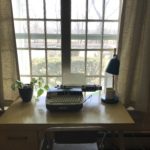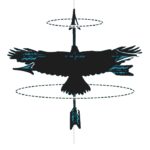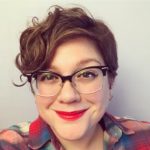 I write most and best in the morning, or afternoon. I have at times written at my writing space, or the dining room table, or at work, or where ever the inspiration takes hold. I have few writing rituals, though most often coffee is involved. I just recently moved, and my new writing space is set up to a window, facing the Grand River.
Are there repetitive themes within your writing? Where do you draw inspiration for these themes, and how do you find yourself drawn to them?
There are a lot of mother/daughter themes, examination of personal identity, and I aim to write stories with women in mind, most often. Every time someone asks me why there aren’t more men in my stories that feels like a victory. Read Lord of the Rings and come back to me with a count of the women. In movies and literature we are often written as backgrounds, shadows, plot devices. I’m not interested in making men more comfortable by representing them where they are not necessary to a story about women.
Our goal is to publish absurdly unclassifiable literature. Do you have a favourite piece of writing that goes against the grain?
Jenny Boully’s “The Body: An Essay” is a tremendously good, deeply beautiful work written entirely in footnotes, with no body of work to be noted against, and I just adore it.
What pieces and/or projects are you currently working on?
I am currently in writing limbo. With a lot of change in my daily life, there hasn’t been as much time to sit and let ideas turn into more. I have a never ending short story collection in the works, but am mostly working on writing for myself, rather than an audience, at this moment.
I write most and best in the morning, or afternoon. I have at times written at my writing space, or the dining room table, or at work, or where ever the inspiration takes hold. I have few writing rituals, though most often coffee is involved. I just recently moved, and my new writing space is set up to a window, facing the Grand River.
Are there repetitive themes within your writing? Where do you draw inspiration for these themes, and how do you find yourself drawn to them?
There are a lot of mother/daughter themes, examination of personal identity, and I aim to write stories with women in mind, most often. Every time someone asks me why there aren’t more men in my stories that feels like a victory. Read Lord of the Rings and come back to me with a count of the women. In movies and literature we are often written as backgrounds, shadows, plot devices. I’m not interested in making men more comfortable by representing them where they are not necessary to a story about women.
Our goal is to publish absurdly unclassifiable literature. Do you have a favourite piece of writing that goes against the grain?
Jenny Boully’s “The Body: An Essay” is a tremendously good, deeply beautiful work written entirely in footnotes, with no body of work to be noted against, and I just adore it.
What pieces and/or projects are you currently working on?
I am currently in writing limbo. With a lot of change in my daily life, there hasn’t been as much time to sit and let ideas turn into more. I have a never ending short story collection in the works, but am mostly working on writing for myself, rather than an audience, at this moment.

Ani King is the founder and Editor in Chief of Syntax & Salt Magazine. A comprehensive list of her work is available at thebittenlip.com.
